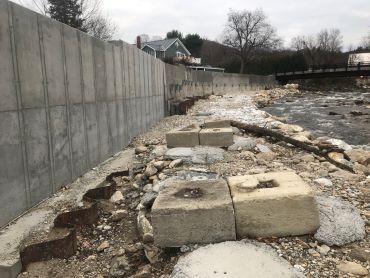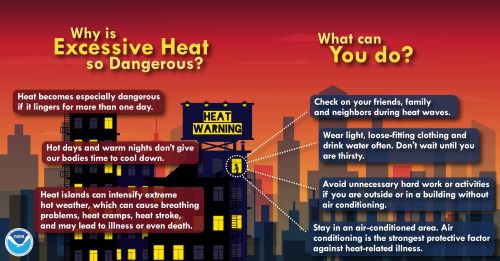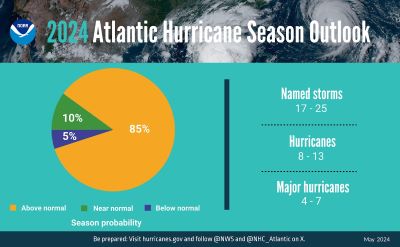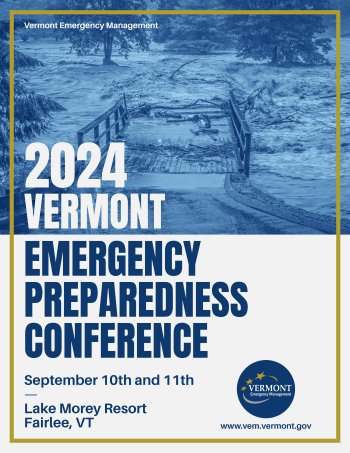
June, 2024
Volume 18 Issue 6
**Best viewed on a computer browser or horizontally if you are on a smartphone**
Hazard Mitigation Funding Now Available With No Local Match
 $90 million of federal funding is now available to Vermont municipalities to implement hazard mitigation measures that reduce future flood risk. These funds are available to all Vermont towns with no local match requirement.
$90 million of federal funding is now available to Vermont municipalities to implement hazard mitigation measures that reduce future flood risk. These funds are available to all Vermont towns with no local match requirement.
The federal Hazard Mitigation Grant Program (HMGP) provides funds to municipalities to harden infrastructure against future flood losses and for voluntary buyouts of homes in flood plains. The program traditionally requires towns to pay 25% of total project costs; the state of Vermont will now pay the local match.
"After the July flooding that many areas of the state experienced, it was clear local communities needed more resources to help them strengthen their infrastructure to mitigate future disasters,” said Governor Phil Scott. “That’s why my budget included $12.5 million to fund the local match portion of the Hazard Mitigation Grant Program.”
HMGP funds pay for projects that help prevent future damage in areas of repetitive flooding. Vermont towns have installed spillways and large culverts in downtowns, flood-proofed public buildings, restored river corridors to keep water within their banks, and purchased homes in floodplains to allow water to flow through without damaging structures.
Cities and towns are strongly encouraged to identify problem areas and submit a pre-application by August 16th. Pre-applications need only provide basic information on a proposed project; more technical information will be reviewed as the application progresses. Vermont Emergency Management and Regional Planning Commission staff assist communities throughout the process.
“Taking the local match off the shoulders of cities and towns lifts a significant barrier that may have deterred towns from applying in the past,” Vermont Emergency Management Director Eric Forand said. “The process may seem daunting to communities that have limited staff, but we are here to help. We encourage towns to apply.”
For more information on the federal and state Hazard Mitigation programs, visit the Vermont Emergency Management mitigation website at www.vem.vermont.gov/funding/mitigation or contact dps.hazardmitigation@vermont.gov.
*Press release from Governor Phil Scott
Heat Safety Resources for Municipalities
As always, the changing season requires responders and the public to modify their preparedness posture, and now is the time to think of summer heat. May 31st was Heat Safety Awareness Day, an opportunity to start planning.
The National Weather Service (NWS) says a warming climate means a longer season of warmth. While Vermont will enjoy many pleasant days, meteorological data indicate we will continue to see an increase in the number of extreme heat days and overall higher temperatures—conditions that lead to more heat-related illnesses.
According to a Health Department analysis, hot weather can be harmful to people living in Vermont when heat index values reach the 80s. Health risks further increase by two to four times when the heat index exceeds 90°F. Those impacts are more severe for people at high risk of heat-related illness and even death, including those who are unhoused, people who work or exercise outdoors, older adults, young children, and those who may live alone without social supports.
Municipalities should have a plan for the summer months. Establish a public cooling center for heat waves, like a town office, library, or school. Many cities and towns also have public places like air-conditioned malls, public beaches, or other areas where people can cool off.
Towns can utilize the Vermont Local Hot Weather Preparedness Guidance and Planning Guide and Template, which is specifically designed to support municipalities with hot weather planning. These resources can be found at www.HealthVermont.gov/Hot-Weather.
The Vermont Department of Health lists places where the public can escape the heat. The locations map can be found on the department’s heat safety page at www.HealthVermont.gov/Hot-Weather, and towns can report additional locations just above the map on that same site.
A town that establishes a special cooling center can also report it to Vermont Emergency Management at vtjic@vermont.gov. VEM will include it on its website and promote the page on social media channels.
NWS says summer heat generally peaks in Vermont from mid-June to mid-August, yet Vermont can see temperatures in the 80s as early as mid-April and as late as October. In addition, summer average temperatures have increased 2 to 3 degrees since 1970.
Recent climatological studies (2002-2022) show that the number of 85-degree or warmer days ranged from 8 to 15 days in northeast Vermont, 15 to 25 days in the interior valleys, and 25 to 35 days in the Champlain and lower-mid Connecticut River valleys.
Watch for symptoms of heat illness:
Symptoms of heat-related illnesses can include muscle cramps, heavy sweating, nausea, headache, or light-headedness. Most can be treated with fluids and by resting in a cooler place. If symptoms persist or worsen, or someone you are with seems confused or loses consciousness, dial 9-1-1 immediately for medical help.
Stay Cool, Stay Hydrated, Stay Informed:
- Look Before You Lock! – Never leave children, people with a disability, older adults, or pets in parked vehicles.
- Drink plenty of water, or non-alcoholic and decaffeinated fluids.
- Wear lightweight, light-colored clothing to reflect heat and sunlight.
- Take frequent breaks and seek relief in air-conditioned or other cool and shady places – Find public cooling locations at HealthVermont.gov/hot-weather.
- Limit outdoor activities during the hottest part of the day.
- Close window shades during the day, keep windows closed when it is hotter outside than inside, and avoid using appliances and lights that generate heat.
- Check on loved ones and neighbors, especially those living alone and without air conditioning.
Heat Safety and Forecast Resources
- Heat Safety Tips and Cooling Sites Map – HealthVermont.gov/Hot-Weather (Information in multiple languages)
- NWS Heat Safety and Resources - Weather.gov/safety/heat
- NWS Burlington Heat page – Weather.gov/btv/heat
- NWS Heat Risk page (NEW/Experimental) - wpc.ncep.noaa.gov/heatrisk/
- Centers for Disease Control and Prevention - CDC.gov/disasters/extremeheat

Atlantic Hurricane Season Forecast: Above Normal
The Official NOAA Atlantic Hurricane Season Outlook was recently released. The Atlantic/Caribbean basin is expected to experience an above-normal season.
What the outlook does not predict is whether there will be any landfalling storms along the Gulf Coast, Atlantic, or New England shorelines. This cannot be predicted, but statistics would suggest that the more storms that develop, the greater the likelihood of landfall somewhere in the U.S.
The chances for a Long Island/Southern New England landfall in any given year are approximately 5-8%.
The 2024 Tropical Atlantic Hurricane Season began on June 1. Now is the time to prepare by reviewing, updating, and testing your Emergency Action Plan. In most cases, the National Weather Service's best-case scenario is 3-5 days' notice prior to any potential landfall across New England.
*From the National Weather Service Burlington

Vermont Emergency Preparedness Conference Registration Open
 The 2024 Vermont Emergency Preparedness Conference will be held September 10th-11th in person at Lake Morey Resort in Fairlee, with limited sessions available virtually. Sessions will begin at 9:00 am, and the day will end by 4:15 pm each day
The 2024 Vermont Emergency Preparedness Conference will be held September 10th-11th in person at Lake Morey Resort in Fairlee, with limited sessions available virtually. Sessions will begin at 9:00 am, and the day will end by 4:15 pm each day
Registration is open on the Vermont Emergency Management website. The final schedule of sessions will be available in mid-July.
If you plan to stay at Lake Morey Resort during the conference please call 1-800-423-1211 and let them know you will be attending the Vermont Emergency Management Conference. Special rates are available until Sunday, August 12th
Nominations for 2024 Emergency Management Director of the Year are now being accepted. Nominations must be received by noon on August 1st to be considered. The recipient will be recognized at the Vermont Emergency Preparedness Conference for demonstrating excellence in the local Emergency Management Director role. To be eligible, a nominee must:
- Have been a duly appointed Emergency Management Director for their town/city at some point between August 1, 2023 and August 1, 2024.
- Be from a town/city with a current Local Emergency Management Plan on file with Vermont Emergency Management.
- Be enrolled in or completed training within the Vermont EMD Certification Program.
Hazard Mitigation Planning Workshop
Vermont Emergency Management and the Federal Emergency Management Agency will host a hazard mitigation planning workshop on June 27th in Waterbury at the VEM office (45 State Drive). The workshop aims to help address common challenges in meeting 2023 FEMA hazard mitigation policy guidance requirements. The training will run from 9:30 a.m. to 3:30 p.m.
Those planning to attend should complete the form. There are also optional questions you may answer to help us tailor the training to your needs.
https://forms.office.com/g/3uwUr5riU8
The training is appropriate for those with and without hazard mitigation planning experience, so all are welcome. However, we recommend reviewing at least one Local Hazard Mitigation Plan and completing the IS-318.A: Local Mitigation Planning Training in advance.
Training
Most trainings require a Learning Management System(LMS) account. If you don’t have an account, you can register for one at the following link: https://vermont.csod.com/selfreg/register.aspx?c=%255e%255e%255eQGm2wxcSUvINsXvXjRYs1A%253d%253d
For a complete listing of trainings go to the Events Calendar in the LMS: https://vermont.csod.com/LMS/catalog/EventsCalendar.aspx?tab_page_id=-10&tab_id=20000513#m=2&d=03/08/2023
VT- Alert Manager Training: This training is now an anytime training in the LMS. We will still host the virtual live training. You can take this training at the following link on the LMS: https://vermont.csod.com/ui/lms-learning-details/app/video/588bdf66-6e68-490e-aa8b-18ccdd115184
June 2024
State Emergency Operation Center Orientation
The purpose of this training is to provide an overview of the State Emergency Operations Center. This course is ONLY available to those who staff the Vermont State Emergency Operations Center.
LOCATION: DPS Headquarters, Waterbury, VT
DATE/TIME: June 4, 2024, 1:00 p.m.- 3:30 p.m.
PREREQUISITES: ICS-100 and WebEOC Sate User Training
REGISTRATION: State Learning Management System
Mental Health First Aid Training
Mental Health First Aid (MHFA) teaches you how to identify, understand and respond to signs of mental health and substance use challenges among adults.
LOCATION: Hybrid- It will be virtual and at DPS Headquarters, Waterbury, VT
DATE/TIME: June 5, 2024, 8:30 a.m. – 4:00 p.m.
REGISTRATION: State Learning Management System
ICS-402- ICS Summary for Executives
The purpose of this course is to provide an orientation to the Incident Command System for Executives and Senior Officials
LOCATION: North Hero Community Hall, North Hero, VT
DATE/TIME: June 15, 2024, 12:00 p.m.- 4:00 p.m.
REGISTRATION: https://forms.office.com/g/4pymRJ8iT5
July 2024
PER -275: Law Enforcement Active Shooter Response
Terrorism involving active shooter attacks on population centers has become part of law enforcement officers’ awareness; however, increased awareness of a problem does not ensure preparedness or appropriate response tactics. This course addresses technical aspects of planning and implementing a rapid law enforcement deployment to an active shooter incident through classroom presentations, hands-on performance-based field training, and scenario-based practical exercises.
LOCATION: Hartford Memorial Middle School, White River Junction, VT
DATE/TIME: July 9-11, 2024, 8:00 a.m.- 5:00 p.m. each day
REGISTRATION: required Louisiana State University National Center for Biomedical Research and Training (LSU NCBRT) Access Code: NCBRT275
This is for LAW ENFORCEMENT ONLY
L0146 Homeland Security Exercise & Evaluation Program (HSEEP)
The Homeland Security Exercise and Evaluation Program (HSEEP) course provides a comprehensive overview of exercise design along with practical skill development. Using the same terminology and processes, this course will provide activities that will give participants an opportunity to interact with many of the templates and other materials that are provided by the National Exercise Division to ensure exercises are conducted in a consistent manner. Anyone who will be a member of an exercise design team or fulfill a role in one of the following areas of the exercise design process: design, development, conduct, evaluation, or improvement process for exercise. The primary audience for the course is training officers, exercise managers, persons who will utilize the exercise and evaluation system, and persons interested in becoming an HSEEP Evaluator for Vermont Emergency Management.
LOCATION: DPS Headquarters, Waterbury, VT
DATE/TIME: July 23-24, 2024, 9:00 a.m.- 4:30 p.m.
PREREQUISITES: IS-120
REGISTRATION: State Learning Management System
August 2024
ICS 400- Advanced ICS for Command and General Staff
This course provides training for personnel who require advanced application of the Incident Command System (ICS). This course expands upon information covered in ICS 100 through ICS 300 courses, which are prerequisites for the ICS 400 course.
LOCATION: Norwich Fire Department- Norwich, VT
DATE/TIME: August 6-7, 2024, 8:00 a.m. – 4:30 p.m. each day
PREREQUISITES: ICS-100, ICS- 200 and ICS- 300
REGISTRATION: State Learning Management System
G0191- ICS/EOC Interface
This course provides an opportunity for participants to begin developing an effective interface between the Incident Command System (ICS) and the Emergency Operations Center (EOC) for their community by applying Incident Command System (ICS) principles. This course reviews ICS and EOC responsibilities and functions and depends heavily on exercises and group discussions to identify interface issues and develop solutions. As part of the course, these concepts are then applied to exercise situations.
LOCATION: Manchester Community Library, Manchester, VT
DATE/TIME: August 13, 2024, 8:00 a.m.- 4:30 p.m.
PREREQUISITES: IS-100, IS-200, IS-700, and IS-800
REGISTRATION: State Learning Management System
MGT -417: Crisis Management for School-Based Incidents for Key Decision Makers
The purpose of this 2 day management/planning level course is to provide the operational-level details to support many of the topics covered in the U.S. Department of Homeland Security (DHS) approved AWR 148: Crisis Management for School-Based Incidents – Partnering Rural Law Enforcement and the Local School Systems awareness-level course. Rural schools, law enforcement, other emergency responders, and community stakeholders are often limited in their access to resources, so it is imperative that all potentially affected parties collaborate in planning, preparation, communication, response, and recovery in the event of a school-based incident. Moreover, these affected parties must come together to practice their interoperable skills through drills and exercises to ensure the strategies in place provide for an effective crisis response and collaborative recovery. With the intent of building upon the foundation of the AWR 148 course and utilizing an all-hazards approach, this two-day course will provide content instruction, develop concept-specific skills, and provide opportunities for law enforcement, school personnel, and community stakeholders to collaboratively apply the course objectives in scenario-based applications.
LOCATION: Middlebury Union High School
DATE/TIME: August 8, 2024, 8:00 a.m.- 4:00 p.m. & August 9, 2024, 8:00 a.m.- 3:30 p.m.
REGISTRATION: Rural Domestic Preparedness Consortium (RDPC)
G0191- ICS/EOC Interface
This course provides an opportunity for participants to begin developing an effective interface between the Incident Command System (ICS) and the Emergency Operations Center (EOC) for their community by applying Incident Command System (ICS) principles. This course reviews ICS and EOC responsibilities and functions and depends heavily on exercises and group discussions to identify interface issues and develop solutions. As part of the course, these concepts are then applied to exercise situations.
LOCATION: Manchester Community Library, Manchester, VT
DATE/TIME: August 13, 2024, 8:00 a.m.- 4:30 p.m.
PREREQUISITES: IS-100, IS-200, IS-700, and IS-800
REGISTRATION: via State Learning Management System
VT- Alert Manager Training
This training is intended for Town Officials who use VT-Alert for public notifications. This class is required for all people who will be using the program at the manager level. This training can also act as a refresher as needed. The class will be approximately 1.5 hours long and consist of sending live test alerts. A computer and internet connection are required. A second computer monitor is highly suggested as there is a follow along portion to the class. Prior to the training please confirm that your town has the required VT-Alert adoption paperwork. If you are unsure please contact dps.vtalert@vermont.gov
LOCATION: Virtual
DATE/TIME: August 14, 2024, 1:00 p.m.- 2:30 p.m.
REGISTRATION: State Learning Management System
L0449- Incident Command System Curricula Train-the-Trainer
This course expands and improves students’ ability to deliver National Incident Management System (NIMS) curricula. Students are provided training on the delivery of:
•ICS-100: Introduction to the ICS
•ICS-200: Basic ICS for Initial Response
•ICS-300: Intermediate ICS for Expanding Incidents
•ICS-400: Advanced ICS for Complex Incidents
•G0402: NIMS Overview for Executives and Senior Officials
•E/L/G0191: Emergency Operations Center/ICS Interface
Emphasis is placed on classroom-based deliveries. This includes compliance with the NIMS Training Program, adult education methodologies, deployment of course activities, pre- and post-testing, and ICS training program management.
LOCATION: Regional Response Coordination Center, Maynard, MA
DATE/TIME: August 19- 23, 2024, 8:00 a.m.- 5:00 p.m. each day
PREREQUISITES:
•IS-100 – Introduction to the Incident Command System, ICS-100
•IS-200 – Basic Incident Command System for Initial Response, ICS-200
•E/L0300 – Intermediate ICS for Expanding Incidents, ICS-300 - Certificate dated June 2019 or later
•E/L0400 – Advanced Incident Command System for Complex Incidents, ICS-400 - Certificate dated June 2019 or later
•IS-700 – An Introduction to the National Incident Management System (NIMS)
•IS-800 – National Response Framework, An Introduction
•E/L/G0191 – Emergency Operations Center/ICS Interface - Certificate dated June 2019 or later
Formal instructor training is required. Below are examples of formal training. Other equivalent courses will be considered.
•M-410, National Wildfire Coordinating Group Facilitative Instructor
•Fire Instructor 1 & 2
•College, Private Industry
•E0141, Instructional Presentation and Evaluation Skills
•Center for Domestic Preparedness Instructor Course
•Valid teaching certificate or equivalent
REGISTRATION: State Training Officer Hillarie Scott will pre-screen all applicants based upon the above target audience and their completion of the courses found in the above prerequisites.
ICS 300- Intermediate ICS for Expanding Incidents
This course focuses on the management of expanding incidents and is intended for those who will be serving in the following positions: command staff, section chiefs, strike team leaders, unit leaders, division and group supervisors, branch directors, multi-agency coordination system staff, and Emergency Operations Center staff. This course is for middle management, strike team leaders, task force leaders, unit leaders, division and group supervisors, branch directors, and Emergency Operations Center staff.
LOCATION: DPS Headquarters- Waterbury, VT
DATE/TIME: August 20-22, 2024, 8:00 a.m. – 4:30 p.m. each day
PREREQUISITES: ICS-100 and ICS-200
REGISTRATION: State Learning Management System
September 2024
2024 Vermont Emergency Preparedness Conference
LOCATION: Lake Morey Resort, Fairlee, VT
DATE/TIME: September 10-11, 2024
https://vem.vermont.gov/conference
State Emergency Operation Center Orientation
The purpose of this training is to provide an overview of the State Emergency Operations Center. This course is ONLY available to those who staff the Vermont State Emergency Operations Center.
LOCATION: DPS Headquarters, Waterbury, VT
DATE/TIME: September 17, 2024, 1:00 p.m.- 3:30 p.m.
PREREQUISITES: ICS-100 and WebEOC Sate User Training
REGISTRATION: State Learning Management System
November 2024
L0146 Homeland Security Exercise & Evaluation Program (HSEEP)
The Homeland Security Exercise and Evaluation Program (HSEEP) course provides a comprehensive overview of exercise design along with practical skill development. Using the same terminology and processes, this course will provide activities that will give participants an opportunity to interact with many of the templates and other materials that are provided by the National Exercise Division to ensure exercises are conducted in a consistent manner. Anyone who will be a member of an exercise design team or fulfill a role in one of the following areas of the exercise design process: design, development, conduct, evaluation or improvement process for exercise. The primary audience for the course is training officers, exercise managers, persons that will utilize the exercise and evaluation system and persons interested in becoming an HSEEP Evaluator for Vermont Emergency Management.
LOCATION: DCF Office, Brattleboro, VT
DATE/TIME: November 12-13, 2024, 9:00 a.m.- 4:30 p.m.
PREREQUISITES: IS-120
REGISTRATION: State Learning Management System
State Emergency Operation Center Orientation
The purpose of this training is to provide an overview of the State Emergency Operations Center. This course is ONLY available to those who staff the Vermont State Emergency Operations Center.
LOCATION: DPS Headquarters, Waterbury, VT
DATE/TIME: November 26, 2024, 1:00 p.m.- 3:30 p.m.
PREREQUISITES: ICS-100 and WebEOC Sate User Training
REGISTRATION: State Learning Management System

